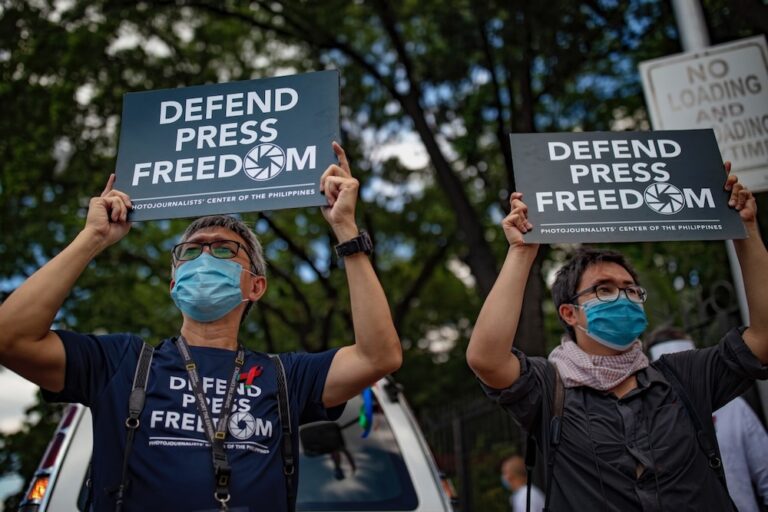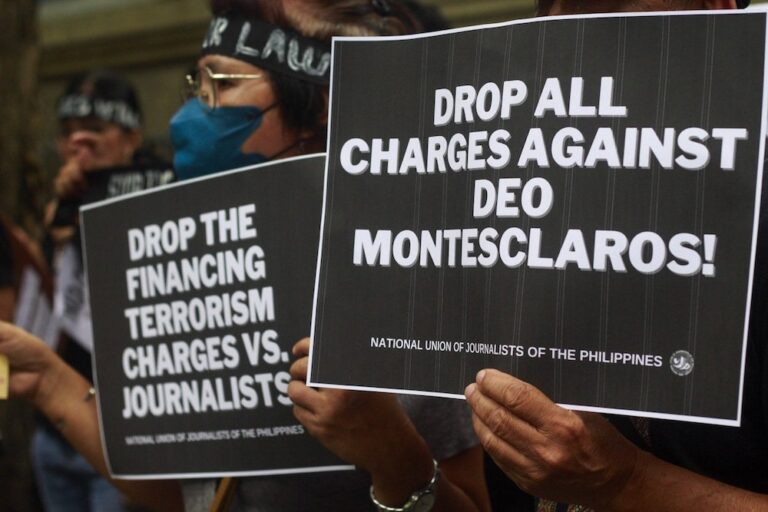(CMFR/IFEX) – On 14 May 2008, the Cebu Court of Appeals issued a writ of preliminary injunction prohibiting the Cebu City Regional Trial Court (RTC) from proceeding with the case against the suspected masterminds in the 2005 murder of journalist Marlene Esperat. Cebu is a province approximately 562 km south of Manila. In a five-page […]
(CMFR/IFEX) – On 14 May 2008, the Cebu Court of Appeals issued a writ of preliminary injunction prohibiting the Cebu City Regional Trial Court (RTC) from proceeding with the case against the suspected masterminds in the 2005 murder of journalist Marlene Esperat. Cebu is a province approximately 562 km south of Manila.
In a five-page resolution penned by Associate Justice Francisco Acosta and co-signed by Associate Justices Amy Lazaro-Javier and Florito Macalino, the Cebu Court of Appeals granted the 7 May petition for a writ of preliminary injunction filed by Osmeña Montañer and Estrella Sabay, both accused of ordering the killing of Esperat, preventing Cebu City RTC Branch 7 Judge Simeon Dumdum Jr. from hearing the case for an indefinite period. It also stopped the 4 February 2008 warrants of arrest against Montañer and Sabay from being served.
Esperat, known as “Madame Witness,” was killed on 24 March 2005 in full view of her children. She had exposed numerous cases of graft and corruption in the Department of Agriculture Region 12 office, where Montañer and Sabay serve as finance officer and regional accountant, respectively.
Based on the arguments during the 24 March 2008 hearing on the petition for certiorari and the 3 April 2008 manifestation of the Office of the Solicitor General (OSG), which sided with the accused, the Court of Appeals was “convinced that justice would be better served if the status quo is preserved until the final determination of the merits of the case.” The OSG serves as the law office of the Philippine government.
The Cebu Court of Appeals granted, last 25 March, the request for a 60-day temporary restraining order (TRO) by Montañer and Sabay.
The Appellate Court said Cebu RTC has no jurisdiction over the murder case filed against the two accused, since it happened in Tacurong City, Sultan Kudarat. It cited the OSG’s comment, filed on 3 April, that the Supreme Court 23 November 2005 order transferring the venue of Criminal Case No. 2568 from Tacurong RTC to Cebu City RTC does not apply to the present case against Montañer and Sabay.
“Criminal Case No. 2568 against petitioners as accused in [Criminal] Case No. CBU-82237 . . . had already become final and can no longer be disturbed by the courts. The filing therefore of the Information against petitioners cannot be said to be a continuation of Criminal Case no. 2568,” the OSG explains.
Criminal Case No. 2568 pertains to the case against Randy Grecia, Gerry Cabayag and Estanislao Bismanos. The three were convicted and sentenced to reclusion perpetua by Cebu City RTC Judge Eric Menchavez on 6 October 2006 through the help of the testimony of suspect-turned-state witness Rowie Barua. Criminal Case No. CBU-82237, on the other hand, refers to the ongoing case against Sabay and Montañer.
When the Supreme Court issued the resolution granting the transfer of venue, Tacurong City RTC Judge Francis Palmones had already dismissed the case against Montañer and Sabay. Palmones dismissed the case even before the prosecution’s presentation of evidence.
The OSG suggested that it would only be possible to hear the case in Cebu if the prosecution withdraws the charges filed before the Cebu RTC, files it before the Tacurong RTC, and asks the Supreme Court to again transfer the venue of the case from Tacurong to Cebu.
On 4 July 2005, the Freedom Fund for Filipino Journalists (FFFJ) filed the petition to transfer the case to Cebu in response to security concerns of the witnesses and considering the clout of the accused which could unduly influence the case if heard in Tacurong. FFFJ is a coalition of six media organizations working to promote and protect press freedom. The Center for Media Freedom and Responsibility is a founding member of FFFJ and serves as its secretariat.
The prosecution has 20 days to reply. Montañer and Sabay, on the other hand, were asked to pay P50,000 (approx. US$1,190) each as injunction bond. Nena Santos, private counsel for the prosecution, said that she only received the copy of Montañer and Sabay’s 7 May petition for a writ of preliminary injunction the same day that the Court of Appeals granted the petition.
“There has not even been a hearing yet a decision has already been reached,” Santos said.
State prosecutor Llena Ipong-Avila said that the prosecution will file a motion to overturn the Court of Appeals injunction within the 20-day deadline, and would bring the case to the Supreme Court if the Cebu Court of Appeals dismisses it.
Seventy-one journalists have been killed in the line of duty since 1986. Not one mastermind has been successfully prosecuted, while only two out of the 33 cases since 2001 have convictions. The Damalerio case, with one conviction for the gunman, and the Esperat case, with three convictions for the gunmen, are the only cases since 2001 in which the killers have been convicted.
Updates the Esperat case: http://ifex.org/en/content/view/full/91996


